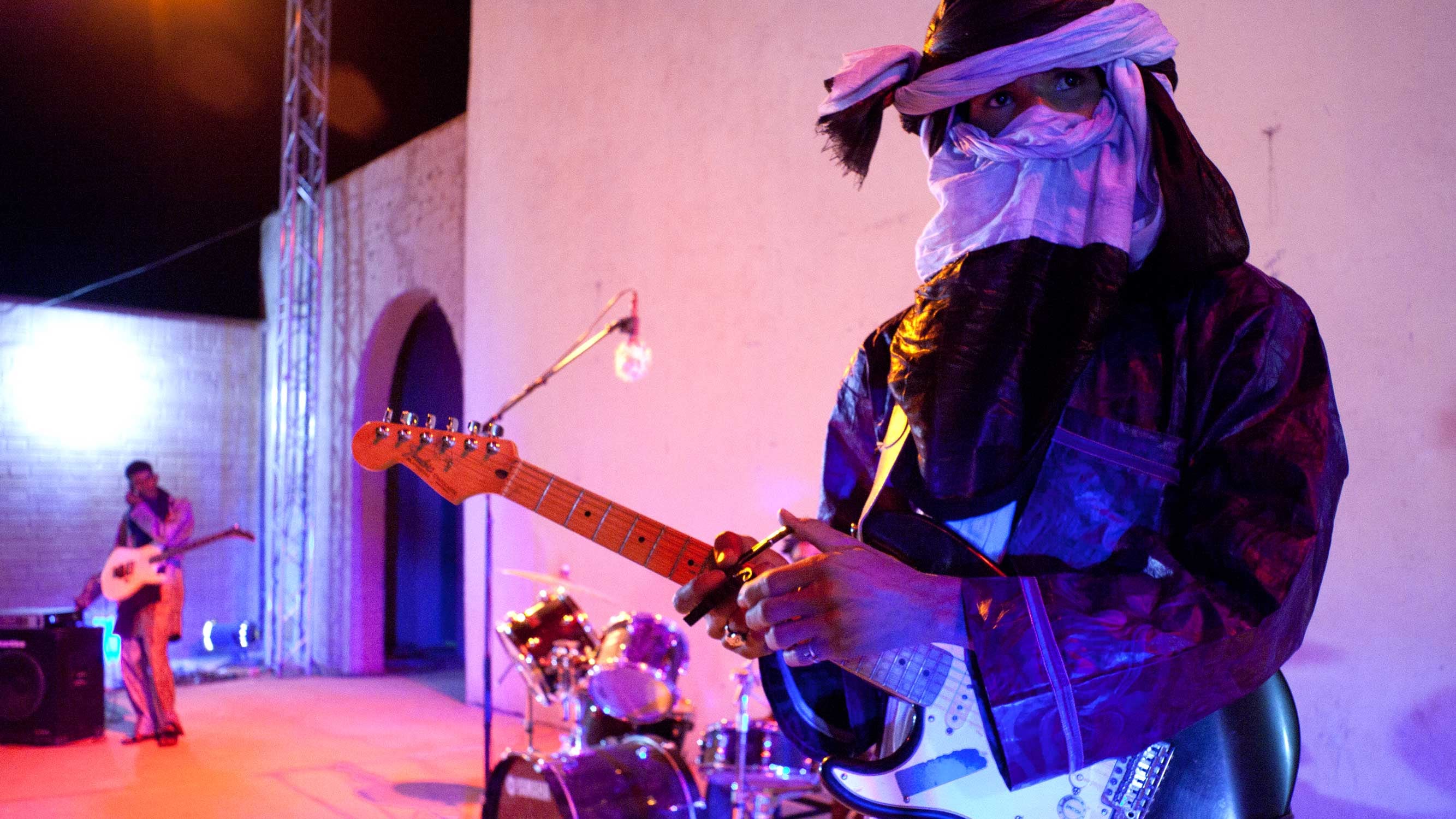Mdou Moctar wears all purple. He rides a purple motorcycle. He plays guitar to crowds of fans. But Mdou (pronounced em-doo), isn't playing at First Avenue. This isn't Minneapolis. No one is cleansing themselves in the waters of Lake Minnetonka. They do it in the sands of the Sahara Desert.
RELATED: Christopher Kirkley's Top Five Tracks from West Africa.
On Friday, Akounak Tedalat Taha Tazoughai—which translates from the language of the nomadic Tuareg people into "Rain the Color of Blue With a Little Red in It"—kicks off the 27th Annual Cascade Festival of African Films, and as the title hints, it's a remake of the classic Prince vehicle Purple Rain. Instead of telling the story of the Kid trying to juggle his relationship with his abusive father, his romance with Apollonia and his rivalry with Morris Day, it's a story of a nomadic guitarist trying to juggle his relationship with his disapproving father, his relationship with Rhaicha (Rhaicha Ibrahim) and his rivalry with Kader (Kader Tanoutanoute), in the Nigerien desert city Agadez.
How the hell did such a weird movie get made? Portland ethnomusicologist Christopher Kirkley spent years in West Africa researching, recording and distributing the music of isolated musicians through his label, Sahel Sounds. In 2013, he tried his hand at filmmaking and, on a budget of about $20,000, created the first film ever made in the Tamashek language of the Tuareg people.

The amount of attention the film got at festivals was impressive, says Kirkley, who has been profiled in The Wall Street Journal and The Village Voice. "We've showed it all over South America, Singapore, Vietnam. It's had a lot of attention for something that I did nothing to promote."
For a film made by an amateur director on a shoestring budget in the middle of the goddamn desert, it ain't bad, mostly because the music itself rules. The Tuareg guitar sound is fairly well-known in the world music community through Grammy-winning acts like Tinariwen. For those unfamiliar, it's something like a psychedelic, riff-laden cross between surf and stoner rock. Kirkley rightly focuses his camera on the musicians, but intersperses the details of life in Agadez throughout the film—images of teapots heating on smouldering embers and plastic stereos suspended with twine. He manages to adapt a heavily stylized film about youthful expression and rebellion to a deeply traditional culture where entire plot lines from Purple Rain, like suicide and domestic violence, wouldn't fly.
RELATED: A Portland ethnomusicologist remakes Purple Rain in the Sahara.
Last year, Kirkley returned to Agadez to begin production on a new film, Zerzura, for which he is currently raising money via Kickstarter. Where Akounak is deliberately apolitical, Zerzura will weave contemporary issues about trans-Saharan migration into desert folklore dating back to at least the 14th century.
"Zerzura is a modern-day folk tale about a young Tuareg who sees all the migrants passing through his town and discovers that people are going to a mythical city in the Sahara, a magical city full of gold," says Kirkley. "He takes off to find this place. Zerzura draws on regional folklore, but also holds it up against modern-day issues of immigration and the quest for something else—which is a contemporary issue in the Sahara, as a lot of people from all over West Africa come to Agadez before they go to Libya, where they get on boats and cross the Mediterranean for Europe."
In Niger, this kind of filmmaking is no safe bet. The Sahara isn't dissimilar to the Wild West, except with automatic weapons and an active branch of Al-Qaeda. "Kidnapping and ransoms are a real thing that happen," says Kirkley. "If you want to shoot out in the desert, you either have to do it in the cover of darkness or hire a military escort. And if you're filming in Agadez, you have to make sure there's certain people you don't film. There's cocaine trafficking, so we had to be cognizant of who we could film and which houses we couldn't."
Thankfully, Akounak and Zerzura are providing opportunities to the Tuareg that wouldn't otherwise be available. Moctar's profile has risen considerably since the film's debut, helping him tour internationally. He will be in Portland for the screening of Akounak, playing a show as part of the opening night of the festival. In January, Kirkley announced that Ahmoudou Madassane, the star of Zerzura, will travel to Portland to work on post-production as part of a grant from the Oregon Arts Commission.
"One of the biggest things we wanted to do with the film was to show that you didn't need a fancy budget or filmmaking background to make a movie in Agadez," says Kirkley. "While I was back in Agadez, there was a team of young kids that approached me and said, 'We're making a film about a guitarist in Agadez.' Imitation is the sincerest form of flattery, right?"
SEE IT: The 27th Annual Cascade Festival of African Films opens at the Hollywood Theatre on Friday, Feb. 3, with screenings of Akounak Tedalat Taha Tazoughai at 6:30 and 9:15 pm. Mdou Moctar plays at 11:15 pm. Visit africanfilmfestival.org for the festival's full schedule.

